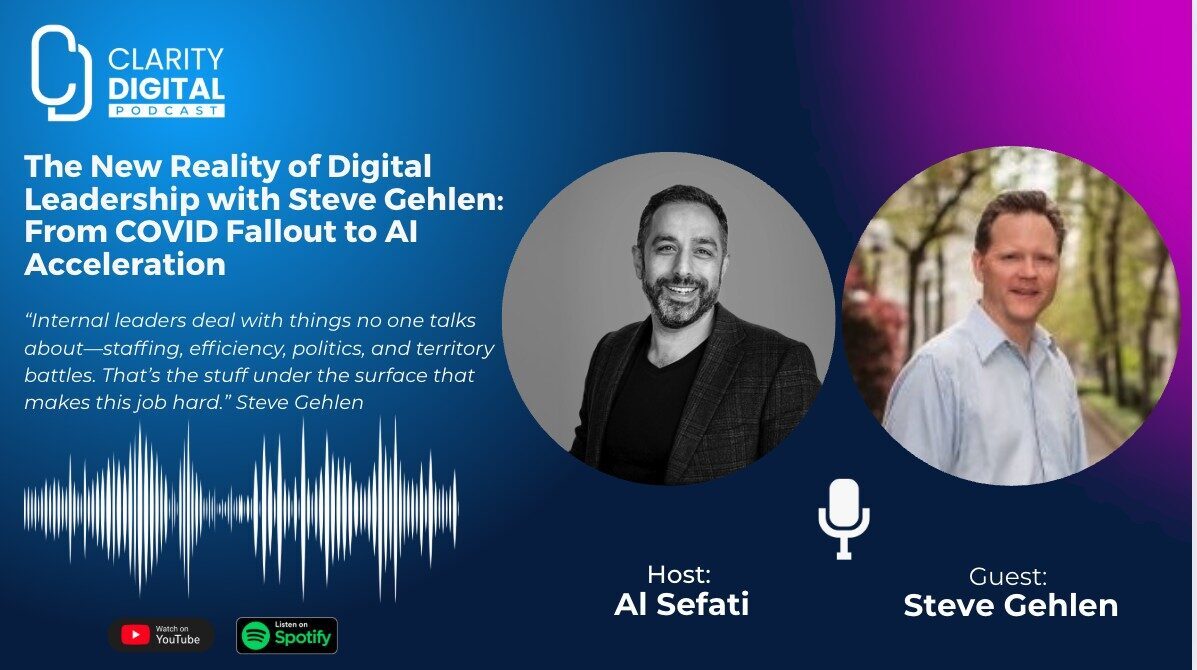A Conversation with Comedian & Marketing Consultant Mike Albanese (Summary)
Marketing is all about connection. But in today’s world of AI-driven automation and data-driven strategies, many marketers are losing sight of the one thing that makes messaging truly resonate: human emotion.
In this episode of Clarity Digital Pod, host Al Sefati sits down with comedian, writer, and marketing consultant Mike Albanese to explore the role of humor in marketing—why it works, how to use it effectively, and why it remains one of the most powerful tools for engagement.
If you’ve ever wondered how to make B2B marketing less boring, why AI can’t replace creativity, and how marketers can leverage humor without crossing the line, this conversation is for you.
Meet Mike Albanese: From Stand-Up Comedy to Marketing Strategy
Mike’s career started in stand-up comedy, performing and touring across the country. Over time, his ability to craft jokes and compelling narratives led him to work with brands, TV shows, and corporate events. He has written for Netflix comedy specials, hosted events like Digital Summit, and now runs Borough House Creative, where he helps businesses inject personality and wit into their messaging.
But how does comedy translate to marketing strategy? According to Mike, humor is not just about making people laugh—it’s about making messages more relatable, memorable, and engaging.
“People don’t connect with brands; they connect with personalities. Clever messaging and humor make brands feel more human.” – Mike Albanese
Why Humor Works in Marketing
Humor in marketing isn’t about being a stand-up comedian—it’s about making messaging more digestible and memorable. Studies show that humor increases brand recall, engagement, and shareability. It also helps brands break through the noise in a crowded digital space.
Here’s why humor works:
- It grabs attention – People scroll past generic ads, but humor makes them stop and pay attention.
- It builds emotional connection – A funny or clever ad creates a positive emotional response, making people more likely to remember the brand.
- It makes brands relatable – Nobody wants to engage with a faceless corporate entity. Humor humanizes brands.
- It drives engagement – People are more likely to share content that makes them laugh, increasing organic reach.
Mike shared a great example: FreeCreditReport.com struggled to stand out until they introduced a fictional rock band in their commercials. Suddenly, their brand awareness skyrocketed, proving that even the most boring industries can benefit from humor.
AI vs. Human Creativity: Can AI Replicate Humor?
A hot topic in marketing today is AI-generated content. While AI tools can streamline workflows, generate copy, and even mimic certain styles, they lack emotional intelligence (EQ)—something that humor heavily relies on.
Mike shared his take on AI in marketing:
“AI can help with productivity, but it can’t replace human creativity. The best messaging comes from understanding people, not just analyzing data.”
Many brands are rushing to automate everything, but is that really the right move? Mike warns against relying too much on AI-generated content, saying:
“If AI is generating emails and another AI is responding to those emails, what’s the point? It’s just machines talking to machines.”
Humor, cleverness, and subtle emotional cues are things AI still struggles with. While AI can assist, it’s the human touch that makes marketing truly effective.
How to Use Humor in Marketing (Without Offending People)
One of the biggest fears brands have about using humor is offending their audience. In today’s diverse and sensitive world, brands need to be thoughtful and intentional about how they approach humor.
Here are Mike’s top rules for using humor in marketing:
1. Create a Yes/No List
Before writing anything, make a list of topics you will and won’t joke about. If your brand wants to avoid politics, religion, or cultural issues, cross them off the list and stick to it.
2. Test Your Messaging
Before launching a humorous campaign, test it with different audiences. Get feedback from real people outside your team to see how it lands.
3. Use Worst-Case Scenario Brainstorming
Instead of only focusing on why people should use your product, try brainstorming who shouldn’t use it in a humorous way. This approach can uncover creative marketing angles.
4. Keep It Relatable
Humor should be based on shared experiences, not inside jokes. Mike recommends using everyday situations that resonate with your target audience.
5. Make It Conversational
People don’t engage with corporate-sounding messaging. Write like you talk and make your brand feel like a personality instead of a corporation.
Why B2B Marketing Needs More Personality
Many B2B brands avoid humor because they think it’s “not professional.” But as Mike pointed out, business buyers are still people—and people respond to emotionally engaging content.
“B2B marketers forget that there are real people behind those businesses. They focus so much on pain points that they forget to make their messaging enjoyable.”
The takeaway? Even B2B brands can use humor to make their messaging less robotic and more engaging.
How to Measure Success in Humor Marketing
A common question marketers ask is: How do we measure if humor is working?
Mike’s answer: Look at shares, not just views.
“Views and likes can be bought, but shares are harder to fake. If people are sharing your content, that’s a strong indicator that it resonates.”
Shares indicate that people not only enjoyed your content but felt compelled to pass it along—a strong sign of organic engagement.
Final Thoughts: Be Bold, But Be Smart
Humor in marketing isn’t about making jokes—it’s about making messaging more engaging, clever, and relatable.
Key takeaways from this episode:
- Humor grabs attention and improves brand recall
- AI can assist marketing, but it can’t replace human creativity
- B2B marketing doesn’t have to be boring—personality matters
- Keep humor relatable and avoid controversial topics
- Measure success by shares, not just views or likes
Want to Work with Mike Albanese?
If you’re looking to inject humor, clever messaging, and personality into your brand’s marketing, check out Mike’s creative agency:
BoroughHouseCreative.com
Email: [email protected]
For more marketing insights, strategy, and industry discussions, subscribe to Clarity Digital Pod and follow Al Sefati for upcoming episodes.





